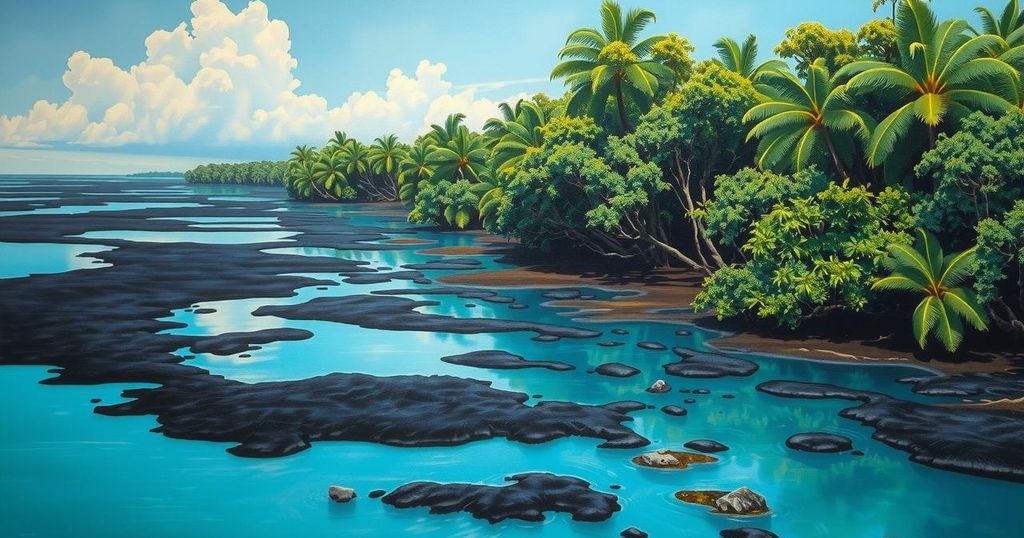Ecuador’s Oil Spill: A Devastating Crisis and the Call for Accountability

An oil spill in Ecuador released over 25,000 barrels of crude oil in March 2023, significantly impacting local communities and ecosystems. After facing criticism for downplaying the crisis, the government continues to neglect affected areas. The incident highlights the long-standing issues within Ecuador’s oil industry and spurs activism to halt future drilling initiatives, aiming to safeguard Indigenous territories and the environment.
In March 2023, a catastrophic oil spill in Ecuador released over 25,000 barrels of crude oil into rivers and protected areas in Esmeraldas province, impacting the environment and local communities significantly. The spill contaminated drinking water and severely disrupted the livelihoods of around half a million people as the oil spread 86 kilometers to the Pacific Ocean, affecting mangroves and wildlife. This incident has been described as a national emergency by local officials.
As the situation escalated, President Daniel Noboa faced criticism for downplaying the crisis. Initially, the Environment Minister claimed that only 3,600 barrels had leaked, with further official data delays compounding public frustration. On March 25, the situation worsened when a reservoir containing contaminated water breached, complicating cleanup efforts.
By April 7, protests erupted in affected communities due to the government’s inadequate response, with citizens lacking basic emergency services such as potable water and food. The local fishing and tourism industries remain paralyzed almost a month after the spill, exacerbating economic stress for residents.
Despite being in Esmeraldas for a campaign event, President Noboa did not meet with affected communities or visit disaster-stricken areas. Additionally, government representatives have failed to demonstrate accountability is lacking, avoiding Congressional inquiries about plans to address the spill’s impacts.
This incident marks Ecuador’s most severe oil disaster in over three decades, underscoring the long-standing issues of negligence in managing the aging oil pipeline system. Originally constructed in 1972 by Texaco, the Trans-Ecuadorian pipeline system (SOTE) was designed with minimal safeguards, leading to its susceptibility to rupture. Operating since 1989 under Petroecuador, the deteriorating infrastructure has contributed to thousands of oil spills.
Recent records indicate a growing frequency of oil spills in Ecuador, with reports revealing 1,119 spills from 2005 to 2015 and a notable increase to 11 spills weekly by 2022. However, the government’s response has been inadequate, leaving long-term health concerns and economic damages largely unaddressed.
The prospects for communities along the pipeline corridors remain dire, especially as both the current administration and opposition candidate plan to auction new oil drilling blocks in remote Amazon regions. This plan threatens to exacerbate the existing environmental issues and further strain the already failing infrastructure.
In solidarity with the affected communities, Amazon Watch is campaigning against the government’s plans for new oil extraction initiatives. Their End Amazon Crude campaign aims to halt drilling projects that could result in further ecological damage and harm to Indigenous territories.
In the upcoming weeks, Amazon Watch will facilitate meetings with Indigenous leaders in California, the largest importer of Ecuadorian crude oil, to halt new drilling initiatives effectively. This initiative could potentially keep around 800 million barrels of oil in the ground, thereby protecting vital ecosystems and promoting global climate goals.
The oil spill in Ecuador represents a significant environmental disaster with profound implications for local communities and biodiversity. The government’s insufficient response and the ongoing plans for further oil extraction highlight the urgent need for a reevaluation of Ecuador’s oil policies. Activism led by organizations like Amazon Watch seeks to address these challenges and prevent future catastrophes. By advocating against new drilling, they aim to protect Indigenous lands and the environment, representing a crucial effort in the fight for sustainable resource management and accountability.
Original Source: amazonwatch.org





